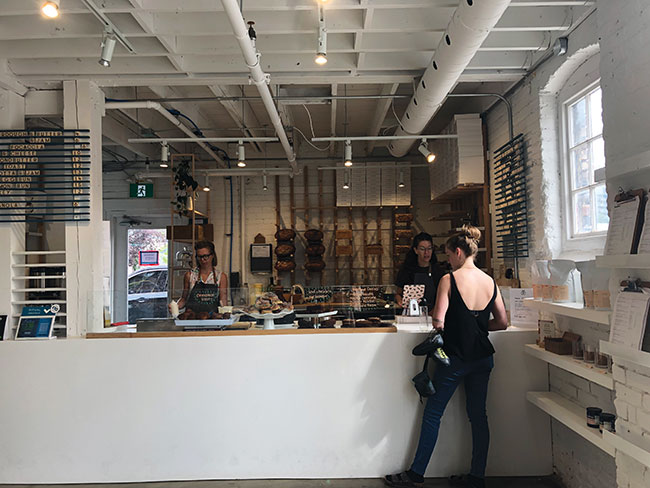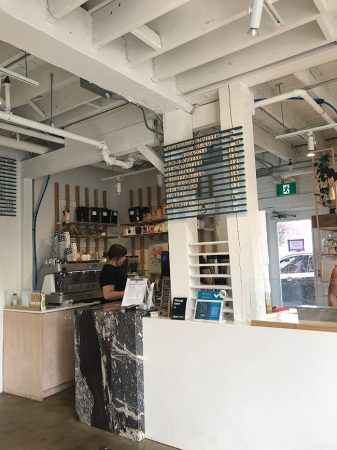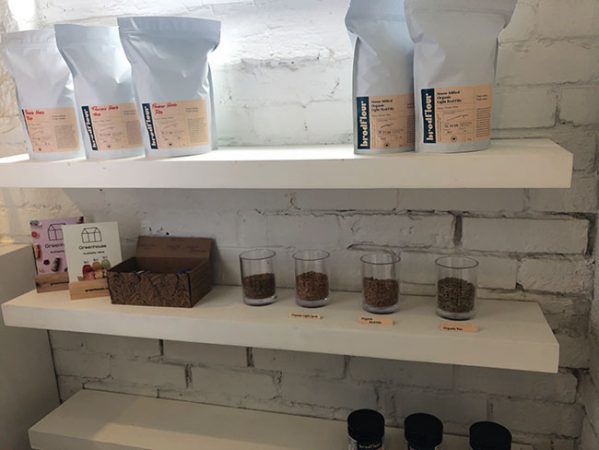
Brodflour
June 15, 2020
By
Bakers Journal
How a bakery thrived pre and post-COVID |
 Brodflour’s clients order hand-made artisanal baked goods made with milled on-site flours. Photo credit: naomi szeben
Brodflour’s clients order hand-made artisanal baked goods made with milled on-site flours. Photo credit: naomi szeben The COVID-19 pandemic affected many companies, but it also changed the way bakeries thought about their business. Some bakers learned how to pivot, changing their line of products to match demand and production limitations. Other bakeries teamed up with different companies to create a partnership that celebrates similar ingredients or a shared philosophy. These are the sorts of stories you’ll hear about in Bakers Journal’s “Good Neighbours” series.
Once such Good Neighbour story is Brodflour, a bakery and fresh flour mill situated in downtown Toronto. Brodflour sells freshly baked breads and pastry, made from flour they mill themselves. “On site stone milling is central to what Brodflour is about,” states the general manager, and co-founder, Matt Faust. Its Liberty Village setting means that clients are largely office workers, and as the pandemic surged, clients waned. “It’s an office crowd, so we hadn’t found people were buying a ton of bread or flour.”
The bakery’s entire raison-d’être is pinned on its flour. The owners, Dara Gallinger and Ronnen Harary wanted to changed the way commercial bakeries work with flour. To get the very best quality and the freshest possible product, they decided to build a business that was both a mill and a bakery. Brodflour stone-ground its own flour to be used within 24 hours of milling.
Though flour is what the bakery wants to be known for, the company’s focus is on freshness and high quality grain.
“During this pandemic. It’s actually brought that to light so we’ve had an inflection point. People are coming in, buying sandwiches and coffee, and that’s great, but we wanted people to see our flour and experience that fresh milled product. And then, the switch flipped.”
The miller vs. bakery dilemma was solved when Toronto consumers had difficulty finding either flour or yeast in their grocery stores.
The bakery decided to sell more flour, but with limitedbakery space, few customers could enter at the same time. The second problem involved creating a new line of clients. While Brodflour already made brisk business with local groceries and fine food retailers, they wanted to provide fresh flour to home bakers who needed it, and the artisanal label didn’t deter any retail customers.
“We’re offering flour at a higher price point than what you would normally see. It’s a special product. [Flour milling] has definitely made things a lot busier for us. In terms of a sales perspective, what we would sell in flour in one month, pre-COVID, we now do in about two days.” During the lockdown, the bakery made a choice to keep business running by focusing on flour production. “So we would run our stone mill for two to three hours a day. Now we’ve run it seven to eight hours a day. One of the challenges is being able to keep up with that. Sometimes our bakers share the responsibility of milling, but we do have a full time miller here.” The bakery continues to make breads with its freshly made flour for customers, but business is now strictly delivery or contactless pickup. “People can just call in, and they pay for their order. We have a table inside, we leave the bread there. And that’s it. Really, the main ways that we’re getting our product out on the retail side is that our flour is sold retail to some big grocery stores.” The real challenge lies with direct-to-consumer delivery. “We’re still such a small company. We only have one delivery truck.” Faust proudly adds that Brodflour was selected by higher-end online grocery delivery services such as Companies like Grow, Gather & Co. who curate food baskets for the discerning gourmet. “You’ll get some really nice produce and some really nice meats, and they’re also featuring our flour,” explained Faust.
“They used the best of the best, and they’re just trying to highlight local high-end food manufacturers that are basically doing something really cool and artisanal, kind of on a smaller scale. So that’s really helped us get our name out,” adds Faust.
Part of the advantage to partnering with other companies resulted in some interesting cross-promotional advertising. Brodflour was “good neighbours” with the Greenhouse Juice Co. “We actually grew up with their owners, so we know them well,” recounts Faust. “We’ve had a good relationship. So, Greenhouse stocks our flour on a weekly basis, so they’re still providing fresh product. And as long as you hit their minimum of, $30 or $40, clients can get our products delivered the next day to their door, and [Greenhouse] is also doing the same thing, working with really unique plant-based products. That allows us to expand our delivery zone and go directly to the consumer.”
Anna James of Greenhouse Juice was the one to reach out to Brodflour, however they had “always been in conversation about how we can collaborate together.” They were already offering some of Brodflour’s breads, at one or two of their locations. “But, we never really had a mutual retail relationship, [prior to the COVID-19 outbreak].
It was really us just retailing purchases,” clarifies Faust.
The Greenhouse and Brodflour partnership resulted in the Plant Pantry. Subscribers were able to acquire basic pantry supplies such as Brodflour’s freshly milled flour, fresh juices, and produce. Even restaurants like Blondie’s also raised their revenue by adding their ‘pizza kit’ to the Plant Pantry. “We’re always open to partnering with other brands that kind of speak to our ethos. So any anyone that kind of shares our vision for having a fresh product, something that kind of changes the way the consumer thinks about a staple that we’ve all previously seen as shelf stable.”
On top of providing fresh food, for every purchase made in April, Greenhouse donated a toonie from every order containing a Plant Pantry item to the CanadaHelps COVID-19 Community Care Fund in support of vulnerable communities across Canada affected by the pandemic.
“It’s part of our founders’ philosophy to give a lot back to the community,” explains Faust.
“My motto has just been, say ‘yes’ to any opportunity. Figure it out after it happens. Every day we encounter problems, and these are just challenges that can be solved easily.”
Print this page


Leave a Reply